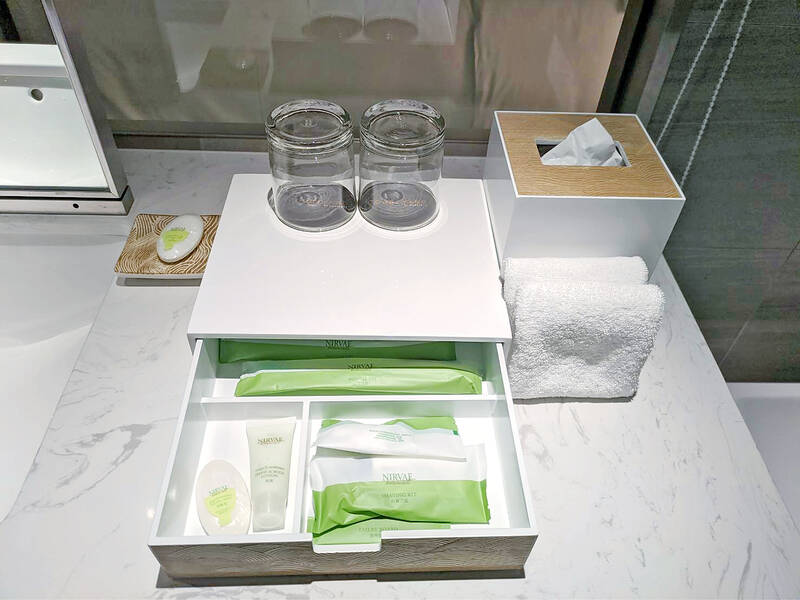The hospitality industry would be required to limit the use of disposable toiletry items, the Environmental Protection Administration (EPA) said yesterday as it announced a draft bill expected to be implemented on July 1.
In the first phase, hoteliers would be asked not to provide disposable items such as toothbrushes, razors, and travel-sized bottles of shampoo and body wash in rooms, instead requiring guests to request such items.
The second phase would require that the items not be provided for free, requiring guests to purchase them if needed.

Photo: Wu Po-hsuan, Taipei Times
The draft is to implement stipulations of Article 21 of the Waste Disposal Act (廢棄物清理法), the EPA said.
The article states that “for those articles or the packaging and containers thereof for which there is concern of serious pollution to the environment, the central competent authority may officially announce the prohibition of use or the restriction of manufacturing, import, sales and use.”
The draft lists lotions, gels and other liquid products in containers of up to 180ml; personal hygiene products including combs, toothbrushes, razors and shower caps; and disposable slippers as items to be restricted.
The date for implementation of the second phase would be announced later, it said, adding that hoteliers should discount room rates by 5 percent in that phase to offset the lack of provided toiletries, and provide a list of prices in rooms.
The EPA said it aimed to reduce plastic waste following a global trend, illustrated by a pledge during the UN Environment Assembly in Nairobi in February and March last year.
At the assembly, which excluded Taiwan, 154 countries vowed to formulate by next year a legally binding agreement on plastic reduction, with the aim to significantly reduce single-use plastic products by 2030.
Since 2020, the UN Environment Programme has been pushing an initiative to reduce tourism-related plastic, as tourism activities are the cause of a large amount of plastic and other waste that ends up in oceans, the EPA said, adding that it hoped Taiwan would participate.
The public can view the bill online and provide feedback for the next 60 days, it said.
“We hope people can cultivate the habit of bringing their own toiletries with them when they travel and reuse containers whenever possible,” the EPA said.
Taiwan Tourist Hotel Association executive director Su Shen-tung (蘇神童) said that not providing toiletry items to guests would result in disputes with some guests who are used to getting them for free.
Also, most guests would simply pay for the items to avoid inconvenience, meaning that the policy would not have much effect on environmental problems, Su said.
“If the items are charged at 5 percent of the room rate, that means NT$50 for every NT$1,000 charged for the room. If the items are sold at cost, that would only be about NT$3 for a disposable razor,” he said.
“People are likely to pay that just to avoid the trouble of bringing items with them,” he added.
Tourism Bureau Director Huang Yi-cheng (黃易成) said that the gradual reduction of the use of hotel supplies is a global trend, which Taiwan would inevitably follow.
The new policy would be promoted to inform travelers, Huang said.
Additional reporting by Ting Yi

Chinese Nationalist Party (KMT) Chairman Eric Chu (朱立倫), spokeswoman Yang Chih-yu (楊智伃) and Legislator Hsieh Lung-chieh (謝龍介) would be summoned by police for questioning for leading an illegal assembly on Thursday evening last week, Minister of the Interior Liu Shyh-fang (劉世芳) said today. The three KMT officials led an assembly outside the Taipei City Prosecutors’ Office, a restricted area where public assembly is not allowed, protesting the questioning of several KMT staff and searches of KMT headquarters and offices in a recall petition forgery case. Chu, Yang and Hsieh are all suspected of contravening the Assembly and Parade Act (集會遊行法) by holding

PRAISE: Japanese visitor Takashi Kubota said the Taiwanese temple architecture images showcased in the AI Art Gallery were the most impressive displays he saw Taiwan does not have an official pavilion at the World Expo in Osaka, Japan, because of its diplomatic predicament, but the government-backed Tech World pavilion is drawing interest with its unique recreations of works by Taiwanese artists. The pavilion features an artificial intelligence (AI)-based art gallery showcasing works of famous Taiwanese artists from the Japanese colonial period using innovative technologies. Among its main simulated displays are Eastern gouache paintings by Chen Chin (陳進), Lin Yu-shan (林玉山) and Kuo Hsueh-hu (郭雪湖), who were the three young Taiwanese painters selected for the East Asian Painting exhibition in 1927. Gouache is a water-based

Taiwan would welcome the return of Honduras as a diplomatic ally if its next president decides to make such a move, Minister of Foreign Affairs Lin Chia-lung (林佳龍) said yesterday. “Of course, we would welcome Honduras if they want to restore diplomatic ties with Taiwan after their elections,” Lin said at a meeting of the legislature’s Foreign Affairs and National Defense Committee, when asked to comment on statements made by two of the three Honduran presidential candidates during the presidential campaign in the Central American country. Taiwan is paying close attention to the region as a whole in the wake of a

OFF-TARGET: More than 30,000 participants were expected to take part in the Games next month, but only 6,550 foreign and 19,400 Taiwanese athletes have registered Taipei city councilors yesterday blasted the organizers of next month’s World Masters Games over sudden timetable and venue changes, which they said have caused thousands of participants to back out of the international sporting event, among other organizational issues. They also cited visa delays and political interference by China as reasons many foreign athletes are requesting refunds for the event, to be held from May 17 to 30. Jointly organized by the Taipei and New Taipei City governments, the games have been rocked by numerous controversies since preparations began in 2020. Taipei City Councilor Lin Yen-feng (林延鳳) said yesterday that new measures by